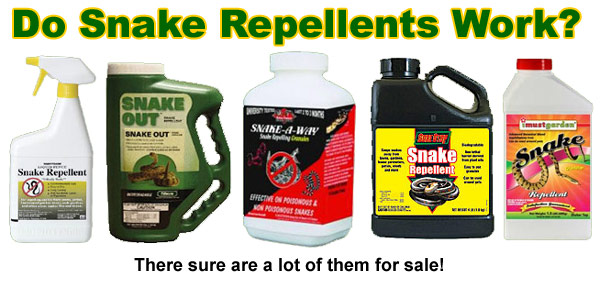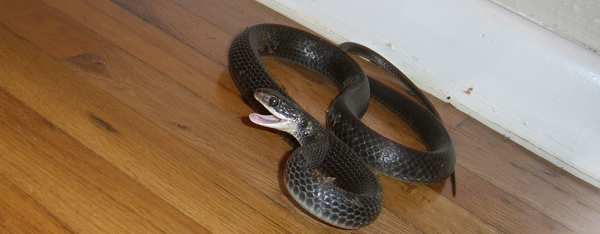- info@wildlife-removal.com
Call us for help in your town
Wildlife Removal Education
Are Mothballs a Good Snake Repellent
Need snake removal in your hometown? We service over 500 USA locations! Click here to hire us in your town and check prices - updated for year 2020.
NO! Mothballs do not repel snakes! That is a complete myth! When I first started out my wildlife removal company, I tried everything. I once had to deal with a den of snakes under a walkway. I bought a very popular
snake repellent made mostly of mothballs (plus sulfur) and dumped two pounds of it down the snake hole. The snakes didn't care at all. They kept using the hole as if nothing was
different. Over the years I've seen probably 40-50 customers who have tried various snake repellents they bought at Home Depot or online, and none of them ever worked at all. I myself
tried a few brands and types at first, until I was absolutely sure they were bogus. And believe me, I wanted a working snake repellent to sell as part of my business. But they just
do not work at all, not whatsoever. Waste of money and time.
Do you need snake removal help? Well, first of all, consider just leaving the snake alone! Most snakes are safe and beneficial. If you really need to get rid of a snake, we can do it for you effectively and safely.
We now service over 500 locations! Click here to hire us for snake removal in your town.

So what should you do if you have a snake problem? I really advise doing nothing. The snake you saw was probably good to have around! If you need to identify the snake, to find out if it was venomous and dangerous,
read my How can you tell if a snake is poisonous guide. You might also want to hire a professional to remove the snake. You could also buy a snake trap, but I
do not recommend that you set them outdoors, as they often trap non-target animals in an inhumane way. But remember - repeated studies have proven that there is no effective snake repellent you can buy, not sulfur,
not predator urine, not lime, not ammonia, not a sound machine, and especially not moth balls!
Don't forget that mothballs are a type of poison, and cause damage to red blood cells in humans and other animals, and can cause liver failure. If you spread them outside, not only will you not at all affect snakes,
but you will be poisoning the land, a terrible thing to do.

Mothball Snake repellent for homes -
If you go into your local tractor and garden center, you will see an entire isle dedicated to using chemical repellents to keep away snakes and other nuisance animals, mostly mothballs. Or more likely, an internet
search will yield dozens of products, such as the ones above. These products are packaged in flashing bottles with big letters to attract consumer attention. Not only are the claims on the labels untrue for most situations, there are no reliable repellents available to homeowners. Professional snake removers do have access to mongoose urine and kingsnake musk, two items that have been known to work better than any of the repellents advertised in stores. Like most effective solutions, only licensed professionals have access. If you’re going to call a professional, instead of asking for their sprays which deteriorate quickly when exposed to the elements, ask them to tell you how to really repel snakes. The answer may surprise you. The real way to keep snakes away from you home is to keep your property from attracting snakes in the first place. Snakes like thick vegetation, buildings with gaps between the ground and the floor, ancient buildings that have fallen down, and so on. You need to make sure you are doing everything possible to keep your yard picked up and mowed. Un-mowed grass is one the worst offenders when you look at causes for snake infestations. It is a natural progression; the long grass breeds insects and the insects attract snakes.
Read some actual helpful tips on my How to get rid of snakes page.
Scam snake repellents -
Most snake repellents are a scam. It’s good to acknowledge that truth now and move on to things that really will work. The most popular pest control method involves using naphthalene, or moth balls. This chemical is not effective against any nuisance animal, and it is more harmful to humans as a carcinogen. Other popular, but ineffective remedies, include peppermint oil and citrus spray. The use of odorants is not new to the nuisance animal world. Humans like to think that strong smells will keep rodents and armadillos and snakes and gophers and bats away. The truth is that animals do not experience smells in the same manner people do. Humans have long since lost the ability to gain much information from a smell beyond that of ‘pleasant’ or ‘unpleasant’. Animals will smell something and decide if it is dangerous or not. There is a big difference between those two methods of information gathering. Most technologically advanced scam methods involve ultrasonic sound emitters. All of these products boast that they emit a sound that humans cannot hear but the specific animal can. Isn’t it interesting that we know all the frequencies for all the pest animals out there, yet not a single human can hear the darn device if it’s working?
Snakes and sulfur -
There’s not much to tell about snakes and sulfur. The reptiles don’t think much about it one way or another. Something to remember about sulfur is that it is a naturally occurring substance in nature. There are few animals with mineral aversions, and out of all of those, the snake is not one of them. Sulphur is a common ingredient in over the counter snake repellents. Companies successfully market these items because people generally dislike the smell of sulphur. It’s human nature to assume that because we don’t like, snakes must not like it either. There are only two odorants that have the potential to repel snakes, and neither of those substances is available commercially. When it comes to keeping snakes away from your home, the best you can do is property modification. When you look at your yard and wonder what there is about it that draws in snakes, you should be looking at your vegetation and the amount of “extra” items in the lawn. Snakes love long grass and it doesn’t even have to be field grass. An un-mowed law that has been growing for a few weeks is more than thick enough to provide a snake cover.
Here are some other snake links:
How To Trap Snakes
What Animals Kill Snakes
Color Rhyme for Coral Snakes
How Can You Tell if a Snake is Poisonous
How to Kill Snakes
Snakebite Aftercare
Snake Safety Tips
How to Catch Snakes
How Do You Keep Snakes Away
Do Mothballs Keep Away Snakes
Eastern Coral Snake
Eastern Diamondback Rattlesnake
Snakes in the Attic
Photographs of Snake Poop
Can You Use Ammonia or Mothballs To Help Repel Snakes?
There are many people whose natural reaction to encountering a problem will be to search online to try and find the answers to problems, but when it comes to dealing with pest animals the answers that are often circulated may not always be the best solution. One of the biggest solutions that you will find discussed is the use of chemicals which are said to drive animals such as snakes away, but in reality it is important to take the information that you can find with a pinch of salt.

Why Do People Think They Might Be Effective?
The challenge with using online forums and guides is that there are several myths that are circulated, and while there are many who may say they have success using these approaches, the reality is that they will not be able to provide evidence to support such techniques. However, it is natural that people will believe what they read, particularly when it appears that many people espouse the same beliefs.
The Theory For Using Strong Chemicals As Repellents
When people catch the scent of either mothballs or ammonia, there is a natural reaction to pull away due to the strong smell that ammonia and mothballs produce. The theory that most people will understand is that this strong scent can repel animals as well as producing the natural reaction in people, but sadly the reality is not quite the same.
Problems With This Approach
Snakes take in a range of different aspects when they are choosing their habitats, and once they have chosen a nest, the presence of a scent such as ammonia and mothballs is unlikely to drive them away from the area. Snakes use their tongues as well as their nostrils to smell, which means that it is particularly sensitive, but while they will identify that the chemicals are toxic, they will not usually see a threat in them.
Dealing With A Snake Infestation Properly
Those who have previous experience of trying to use scent or chemical based repellents to keep snakes away will tell you that these are not an effective way of dealing with the problem. Building a firm barrier fence around the property can prevent the snakes from getting in again, but physically removing the snakes is the best way to get rid of them once they are present. If they are small non-venomous snakes, you will usually be able to remove them yourself, but if the snake is large or dangerous, then it is usually best to hire a professional to deal with the snake.
Go back to the Snake Removal page.


















